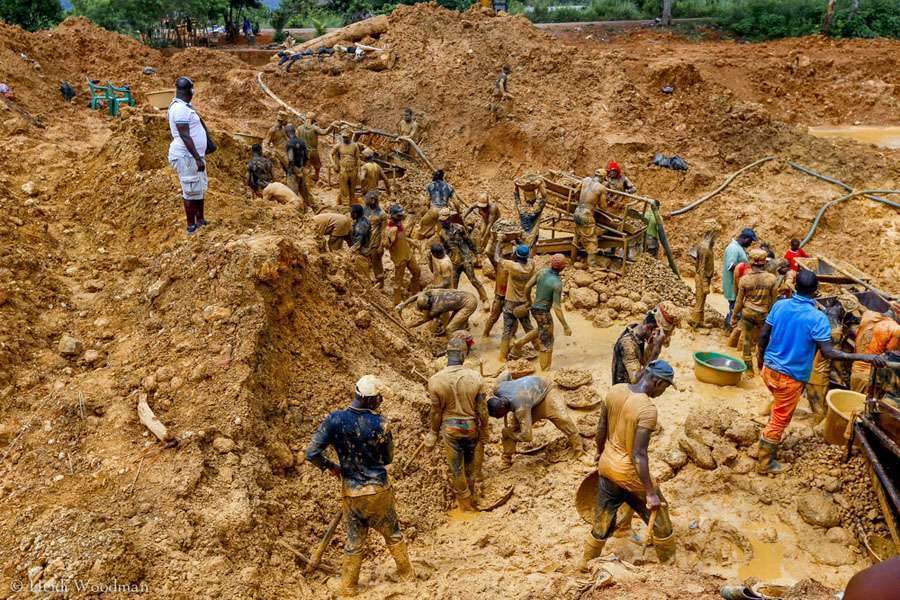While large-scale mining operations often dominate headlines, there’s a lesser-known yet significant player in this landscape: artisanal mining. Artisanal mining refers to small-scale, often informal, mining operations. Typically, these operations are labor-intensive, relying more on human skill and rudimentary tools than on heavy machinery.
In Tanzania, artisanal miners, often working in family groups or cooperatives, extract minerals from deposits that might be uneconomical for large-scale operations. Artisanal mining is a significant source of employment in Tanzania. It’s estimated that hundreds of thousands are directly employed in this sector, with many more benefiting indirectly.
Also read A Step Towards Sustainable Mining: Small-scale Miners and Industrial Mining Stakeholders.
For many families, it’s a primary source of income, especially in regions where alternative employment opportunities are scarce. According to the United Nations Environment Programme (UNEP), the sector employs over a million Tanzanians, many of whom would otherwise be jobless. This grassroots-level mining contributes significantly to local economies, directly feeding into the sustenance and welfare of numerous families.
While the earnings from artisanal mining might seem modest compared to large-scale operations, collectively, they contribute a substantial amount to Tanzania’s foreign exchange reserves. The export of minerals like gold from artisanal mines bolsters the country’s economic stability.
Also, artisanal mining stimulates local economies. Miners spend their earnings locally, supporting businesses ranging from food vendors to transport services. This ripple effect ensures that the benefits of mining are dispersed widely.
Sustainability and Environmental Concerns
Artisanal mining, while economically significant, poses environmental challenges. The use of mercury in gold extraction, deforestation, and poor waste management are some pressing issues.
Tanzania’s government has taken steps to improve and formalize the sector but small-scale miners still face many challenges, including difficulty in obtaining mining land and licenses; inadequate support to improve skills and protection of the environment; limited access to tools and technology.
However, recognizing these challenges, there are concerted efforts, both governmental and non-governmental, to promote sustainable practices among artisanal miners. Training programs emphasize environmentally friendly extraction methods, waste management, and land reclamation.
What About Regulation and Formalization?
One of the primary challenges in harnessing the full potential of artisanal mining is its largely informal nature. Without formal recognition, miners often lack access to credit, training, and market information. They might also face legal challenges, including land disputes.
Tanzania’s government, recognizing the sector’s potential, has initiated steps towards its formalization. By offering training, legal support, and access to credit, the aim is to integrate artisanal mining into the formal economy. This not only enhances its economic contributions but also ensures better regulatory oversight.
Artisanal mining, beyond its economic contributions, has profound social implications. It offers a livelihood to marginalized sections, including women and the elderly.
However, there are challenges too. Child labor, health risks due to exposure to harmful chemicals, and the potential for exploitation are concerns that need addressing.The world of artisanal mining in Tanzania is riddled with gender inequalities.
Women, although active participants, often find themselves at the bottom of the hierarchical ladder, subjected to the most labor-intensive tasks and exposed to greater risks. Their roles are seldom recognized or rewarded adequately, and they are more susceptible to exploitation. Initiatives focusing on education, health awareness, and workers’ rights are crucial in ensuring that the sector’s growth is inclusive and equitable.
Strategies for a Sustainable Future
As Tanzania seeks to unlock the untapped potential of its artisanal mining sector, a multi-pronged strategy is imperative for sustainable growth and development. This approach must address various facets, from skill development to financial accessibility:
Firstly, the cornerstone of this strategy is education and training. Artisanal miners need to be equipped with a diverse skill set that goes beyond basic extraction techniques. Training programs should encompass sustainable mining methods to minimize environmental degradation, as well as business management skills to help miners operate more efficiently and profitably.
Secondly, financial accessibility is crucial. Traditional financial institutions often overlook artisanal miners, leaving them without the means to invest in better tools and safety equipment. Tailored financial products designed specifically for this sector can bridge this gap, enabling miners to upgrade their operations and adhere to safety standards.
Thirdly, market linkages play a pivotal role. The traditional supply chain often involves multiple intermediaries, reducing the share of profits that reach the miners themselves.
By establishing direct linkages between miners and buyers, Tanzania can ensure better price realization for its artisanal miners, reducing exploitation and enhancing income levels.
Lastly, technology cannot be ignored. While artisanal mining is often associated with rudimentary methods, even simple technological interventions can have a transformative impact. From more efficient extraction tools to environmentally friendly processing techniques, technology can enhance operational efficiency while reducing the sector’s environmental footprint.
In light of these insights, while artisanal mining remains a cornerstone of Tanzania’s economy and cultural fabric, it is essential to confront and address its darker aspects. The nation stands at a juncture where it can reshape this industry, ensuring that while the ‘good’ is celebrated, the ‘bad’ is rectified, and the ‘ugly’ is eradicated.
Proper regulatory frameworks, community awareness programs, and international collaborations can be instrumental in driving this change, ensuring a brighter, more sustainable future for Tanzanian artisanal miners.

